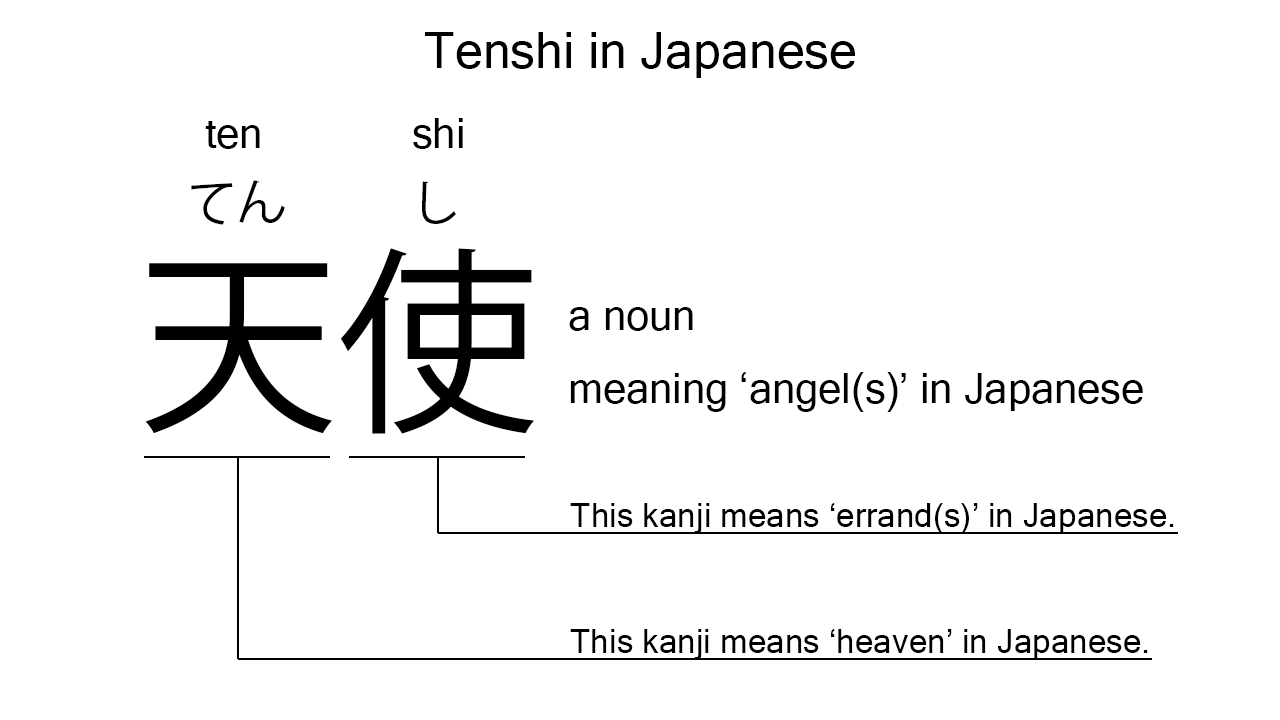What does “tenshi” mean in Japanese?
Native speakers use tenshi to mean an ‘angel’ in Japanese. Perhaps, some Japanese learners know this word as it is sometimes used in Japanese movies, video games, songs, novels, manga, anime, and the like. In this blog post, however, I’m explaining this word in detail based on its kanji expression. And also, I’m explaining how to use it through example sentences. My explanations would help Japanese learners understand tenshi more clearly. Then, let’s get started!
Contents
Definition and meaning of “tenshi”
Let me start with the definition and meaning of tenshi.
- tenshi – 天使 (てんし) : a noun meaning an ‘angel’ in Japanese. This can also work as plural. Learn more about Japanese plural.
Japanese native speakers use this noun to refer to someone sent from heaven by God. He or she often looks like us, but has wings and wears white clothes.
The definition and meaning are simple and clear. To understand this noun more clearly, however, let me explain its kanji characters in detail, one by one.
Tenshi in kanji
The kanji expression of tenshi consists of the following two kanji characters:
- 天 : a kanji character often used to mean ‘heaven’ or ‘sky’ in Japanese.
- 使 : a kanji character used to mean an ‘errand’, ‘messenger’, or ‘bearer’ in Japanese. This kanji can also be found in other words like tsukau and tsukaeru.
From these two kanji characters, we can understand that tenshi literally means an ‘errand from heaven’ in Japanese. This literal interpretation is very close to the actual meaning, I think. Angels can often be considered as errands sent from heaven.

When we meet new kanji expressions, we should check their kanji characters in detail to understand their meanings clearly and deeply. In many cases, kanji characters tell us a lot about the meanings of the expressions they form. Actually, here, we could get the better understanding of tenshi through the detailed kanji check above.
So far, I’ve explained the definition and meaning of tenshi together with its kanji characters. Then, let me explain how to use it through the example sentences below.
How to say “angel” in Japanese
boku wa yume de tenshi wo mi ta – 僕は夢で天使を見た (ぼくはゆめでてんしをみた)
I saw an angel in a dream.
Below are the new words used in the example sentence.
- boku – 僕 (ぼく) : a pronoun meaning ‘I’ in Japanese. This is used mainly by boys and young males.
- wa – は : a binding particle working as a case marker or topic marker. In the example, this works after boku to make the subject in the sentence.
- yume – 夢 (ゆめ) : a noun meaning a ‘dream’ in Japanese. This can also work as plural.
- de – で : a case particle used to say where someone does something. In the example, this is used after yume to say where the speaker saw the angel.
- wo – を : a case particle used to make the object word in a sentence. In the example, this is used after tenshi to make the object in the sentence.
- mi – 見 (み) : one conjugation of the verb, miru, which means ‘to see’, ‘to look’, ‘to watch’, or such in Japanese. In the example, it has been conjugated for the better connection with its following word.
- ta – た : an auxiliary verb used after a verb, adjective, or auxiliary verb to make its past tense form. Probably, this is well known as a part of Japanese ta form. In the example, this is used after mi to make its past tense form, mi ta.
This is a typical usage of tenshi. When we want to mean an ‘angel’ or ‘angels’ in Japanese, this noun is always a very good option.
Another example of “tenshi”
tenshi no tsubasa ga shirokat ta – 天使の翼が白かった (てんしのつばさがしろかった)
The wings of the angel were white.
Below are the new words used in the example sentence.
- no – の : a case particle used to join two nouns. Normally, the first one can work as a modifier to describe the second. In the example, this is used to join tenshi and tsubasa. The formed phrase literally means ‘the wings of the angel’ in Japanese. Word orders in Japanese and English are different, but the role of this case particle is very similar to that of the English preposition, of.
- tsubasa – 翼 (つばさ) : a noun meaning a ‘wing’ in Japanese. This can also work as plural.
- ga – が : a case particle used to make the subject word or the object word in a sentence. In the example, this is used after tenshi no tsubasa to make the subject in the sentence.
- shirokat – 白かっ (しろかっ) : one conjugation of the i-adjective, shiroi, which means ‘white’ in Japanese. In the example, it has been conjugated for the better connection with its following word.
This is another example of tenshi. In this example, it works as a part of the noun phrase, tenshi no tsubasa, which means ‘the wings of the angel’ in Japanese.
Summary
In this blog post, I’ve explained the definition and meaning of tenshi in detail based on its kanji expression. And also, I’ve explained how to use it through the example sentences. Let me summarize them as follows.
- tenshi – 天使 (てんし) : a noun meaning an ‘angel’ in Japanese. This can also work as plural. Japanese native speakers use this noun to refer to someone sent from heaven by God. He or she often looks like us, but has wings and wears white clothes. These two kanji characters literally mean an ‘errand from heaven’ in Japanese. This literal interpretation is very close to the actual meaning, I think. Angels can often be considered as errands sent from heaven.
Hope my explanations are understandable and helpful for Japanese learners.
Leave a Reply